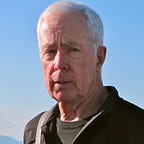The Job I Still Love
A career in medicine and science but a factory job remains the best
I have had many occupations but few jobs since I have enjoyed almost everything that would ordinarily count as work. I look at any new situation as a potentially positive experience, and this attitude makes an occupational situation an adventure and not a job.
The first of these was in a factory, which definitely makes it a job. It provides me with smiles and good memories six decades later. It occupied the summers of late high school and most college years and was an introduction to the working world and its multifaceted characters. It not only provided funds but, by its contrast, confirmed in me the value of an education. Who would have thought a paper mill would do all of that?
It was the fascinating, new-to-me factory environment that made it interesting, educational, and endlessly entertaining. I worked with many people who migrated to Southwestern Ohio from the hills of Kentucky and Tennessee to work in the factories. They were a world apart in time, outlook, and their views on life. Yet, to my surprise, they had opinions, values, styles of living, and ways of life that were thought out and suited them well. I learned much by watching, listening, and befriending them.
I also had my first drink of Kentucky moonshine liquor during a break from sweeping the floor. It was served in a Mason jar.
To a young student, the size and scope of the factory were overwhelming, and I worked in almost all of it over those four summers. There were the enormous paper machines, about a half-block long, that took liquid wood pulp on a screen at one end, dried and compressed it by passing the ribbon of paper-to-be up and down a series of stacks of steam-filled rollers. An endless sheet of paper rolled off the machine at the other end.
The machines were shut down for cleaning but nothing else. If the paper ribbon broke, the paper spewed out between the stacks of rollers in huge piles that had to be taken out from under the machine. This meant someone crawled in there, grabbed the paper, and pulled it out so an experienced worker could direct the paper stream into the next set of rollers and continue production.
Guess who did that. Lying on the concrete floor inside the machine, surrounded by the stacks of hot, high-speed rollers, with paper cascading down on you, and then dragging it out was a rich experience. It was one of the most dangerous things I have ever done, and I did not give my parents any detail about it when asked what I did at the mill.
Another section of the mill put a white Georgia clay coating on paper that was destined for Hallmark Cards. The machines pulled the paper through the mixture and onto sticks that lifted it in large folds onto a belt system that took it about a half-block through the heat to the other end, where it was collected in large rolls. I mixed the clay, helped with the machine, and became trustworthy enough to run the machine for a week while the operator was on vacation.
I knew the more paper the machine put out, the more money I made. So, that first morning, I moved the speed to maximum and kept it there all day. The next day, the foreman, who could not keep from laughing, explained that people on the other end of the machine were complaining and would I reduce the speed. I explained that the faster the machine ran, the more money I made. He smiled and agreed but said I had to slow it down. I set the dial to 2/3 maximum as a compromise, which was accepted. Usually, it ran at 50%.
There were also some good weeks driving a forklift to transport waste materials to a dump behind the factory. When you drive a forklift, no matter how meandering or where you are, you look like someone with purpose, and no one asks anything.
The paper mill was a wonderland of new people, sights, sounds, experiences, and understandings. Not only my best job but an excellent utilitarian preparation for life.
